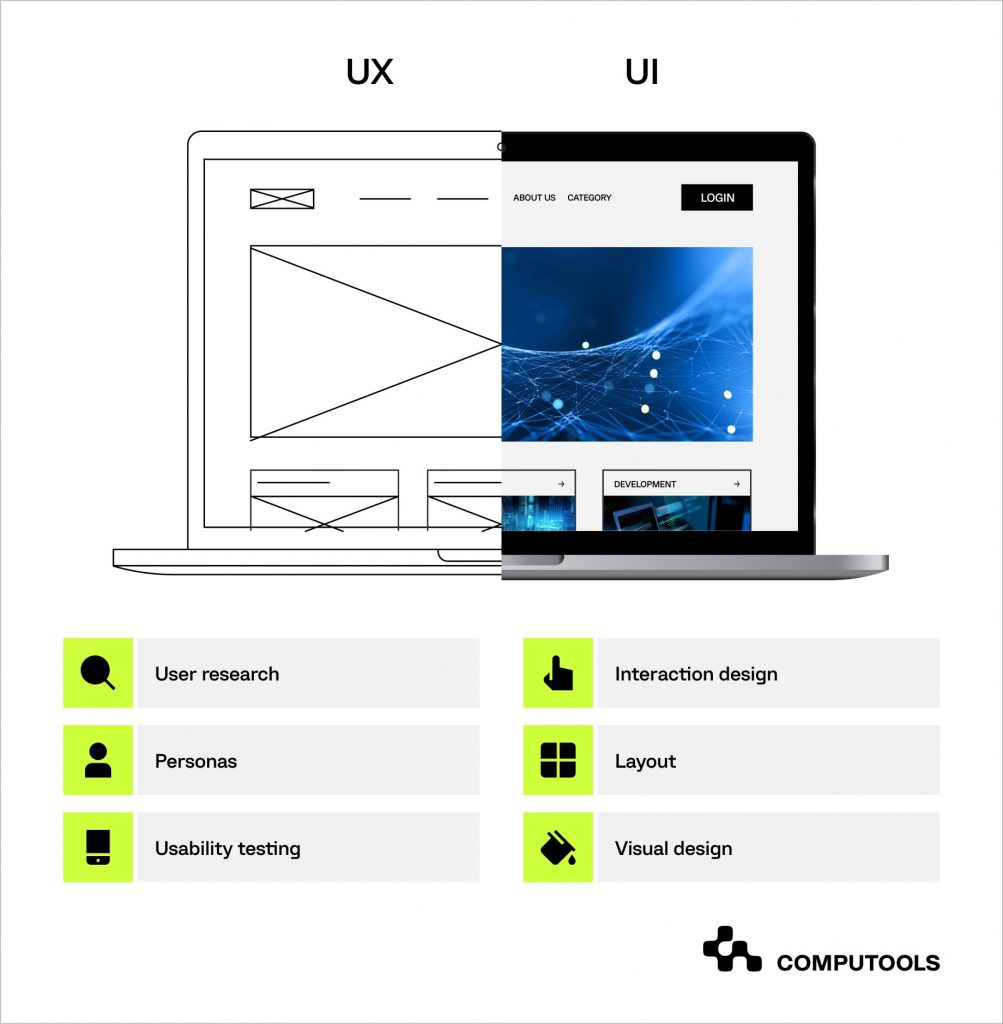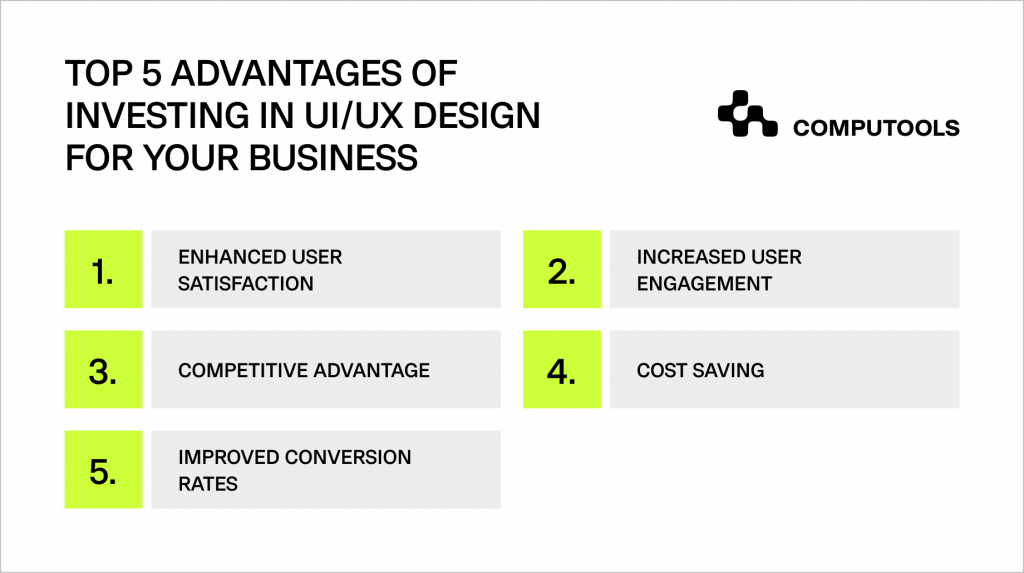The demand for UI/UX services is currently at its peak, rapidly increasing day by day. With a multitude of specialists available, selecting the right one for your business is a complex and significant decision.
The importance of design is underscored by compelling statistics. Research indicates that a staggering 94% of initial user impressions are shaped by design. This truth resonates with us all – being humans, we tend to ‘judge a book by its cover’. That’s why poor design choices may not only break a reputation but also decrease sales and the popularity of the brand.
Wondering how to avoid common issues and make the most out of your design solutions? If you prefer mitigating risks and don’t want to deal with the aftermath of poor decision-making, collaborating with an experienced agency might be the perfect choice for you.
Partnering with a UI/UX design firm offers more than just reliability, proven solutions and a team of skilled professionals. It provides valuable creative insights for future projects, ensures consistent brand representation across all platforms, and grants you control over every stage of the design process.
Experienced design agencies also bring subject matter expertise across a range of industries, from healthcare and fintech to gaming and fashion. Entrusting your website, app, or other product to such a professional can be a smart strategic move for securing its future success.
So, how to find the best UI/UX design agency, steer clear of typical pitfalls and ensure a smooth partnership? Let’s find out together.
Understanding UI/UX Design
Before delving into the process of choosing the proper UI/UX services for your business, let’s begin by grasping the fundamental concepts of UI and UX design.
UI, or user interface, refers to the visual aspect of a product. It includes elements like colours, animations, content and the design of buttons. On the other hand, UX, or user experience, focuses on the emotional response users have while engaging with the interface, whether on desktop or mobile. UX is about how easy or difficult it is for the user to accomplish specific tasks, such as making a purchase, navigating routes or checking prices.
The fundamental difference between UI and UX is akin to designing a restaurant. A UI designer concentrates on the restaurant’s visual elements, such as the staff uniform, colour scheme and menu design, ensuring they look appealing.
A UX designer focuses on the diners’ experience, covering aspects like table arrangement, ease of ordering, quality of service and how enjoyable the dining experience is. UX design encompasses functionality and emotional connection, while UI design deals with the aesthetic representation of the restaurant’s features.

The Role of UI/UX Design for Business
In a world where users rule the game, the significance of UI/UX design in business cannot be overstated. User interface and user experience are more than mere buzzwords, as they form the foundation for crafting engaging and user-friendly digital products, websites, and applications. Econsultancy reports that over 74% of companies directly link good UI/UX design to increased sales.
But exactly how does good design benefit businesses? Here are some key examples:
1. Better user satisfaction: intuitive and user-friendly interfaces lead to higher customer satisfaction, encouraging repeat visits and positive word-of-mouth referrals.
2. Increased conversions: a seamless UX streamlines the customer journey, reducing friction and driving sales and revenue.
3. Improved bBrand perception: thoughtfully designed interfaces create a positive brand image and build trust among users, which is vital for long-term customer relationships.
4. Reduced bounce rates: intuitive navigation and engaging designs reduce bounce rates by keeping visitors engaged and encouraging them to explore the website or application further.
5. Valuable insights: UI/UX design can incorporate analytics tools, providing businesses with valuable user behaviour data. These insights help in making informed decisions and refining the user experience further.

Benefits of Cooperation with a Design Agency
Now that UI/UX design benefits for business are as clear as day, the next questions arise: why is opting for an agency a better choice? What tasks are more effectively handled by a team? What challenges can they adeptly solve?
1. Maintaining consistent software design
As your business expands, maintaining consistent software design becomes a challenge, often resulting in ‘design debt’, where the product’s look and feel become inconsistent and difficult to uphold over time.
A professional design agency, applying the cooperation approach, excels in ensuring a uniform visual identity across diverse platforms, be it websites, mobile applications or other digital interfaces. This consistency not only helps people recognise your brand but also makes customers trust your business more and feel satisfied, something a single person might find challenging to achieve.
2. Staying competitive and updated
While your product might excel in product-market fit and technical brilliance, neglecting design and user experience weakens its perception. Staying competitive requires keeping up with trends and technologies, a demanding task.
Given the rapid evolution of the design market, having a creative UI/UX design agency as your partner can be highly advantageous. It can provide continuous design assistance, extending beyond the initial design phase. This ongoing collaboration may involve regular design updates, user testing, data analysis and more, all available as and when required.
3. Effective project coordination
Allocating limited resources to design, improve and upgrade multiple solutions in your portfolio proves difficult, leading to delays and disruptions in the overall product development plan.
Design agencies possess diverse expertise and skills. They are fully equipped to handle intricate projects right from the start. Their teams consist of various specialists prepared to contribute from different angles, ensuring comprehensive project management.
Moreover, these firms offer rapid onboarding and quick turnaround times. With the entire team dedicated to your project, there won’t be any interruptions if one team member is unavailable.
How to Choose a UI/UX Design Agency for a Business Project
Having a great idea is important, but without effective execution, even the best concept won’t save your business project. A reliable and trustworthy partner is the key to success. Let’s look at important things to do when choosing the right UI/UX design company.
Step 1: Determine Your Requirements
First, begin by outlining your project goals, target audience and desired outcomes. You can create a document encompassing all your expectations, including guidelines and specifications to help you in the research process.
Second, understand the specific design services you require, such as web design, mobile app interfaces, or user experience enhancement.
Finally, define your project scope, budget and timeline to provide clear guidelines for the agency.
Step 2: Conduct Thorough Research
Start your research by exploring various UI/UX design agencies and creating a list of those adhering to your standards. To do so, look into their websites, social media presence and client testimonials.
You can establish parameters or create a ranking to evaluate the agency’s reputation, reliability, and the range of projects they have undertaken. Consider agencies with a diverse portfolio and positive client feedback.
Step 3: Review the Previous Work
During research, study the agency’s portfolio in detail. Assess the quality, creativity and innovation showcased in their past projects.
Focus on projects similar to your requirements and needs, and look for projects that align with your industry or niche. Tag companies with the necessary expertise and experience in your field.
Step 4: Read Client Reviews and Testimonials
Seek feedback from previous clients to gain insights into their experiences. Read Clutch reviews and Goodfirm reviews. These platforms provide verified and valuable information about the agency’s reliability, customer service and overall satisfaction of past clients. Positive feedback indicates a trustworthy and client-oriented agency.
Step 5: Examine the Design Approach and Technology
Understand the agency’s design philosophy and approach, and look at their motto, values and partners. Study their methodologies, such as user research, wireframing, prototyping and usability testing.
Look at the technologies they use, and ask yourself: does the agency have the necessary skills and expertise? Do I understand the methodology and approaches?
Consider an agency with a systematic and user-focused design methodology.
Step 6: Evaluate Communication Abilities
Clear and effective communication is crucial for a successful collaboration between you and the design agency. Pay attention to how quickly they respond to your messages, how clearly they explain their ideas, and how willing they are to understand your goals and preferences.
Open and transparent communication channels are essential for a smooth partnership.
Step 7: Look at Team Experts
Gather information about the professionals who will be working on your project. Usually, the team composition is presented on the UI/UX services page on the website.
Enquire about their skills, experience and expertise in UI/UX design. A skilled and diverse team ensures comprehensive solutions and innovative approaches to design challenges.
Step 8: Consider Pricing Structure
Evaluate the agency’s pricing structure and payment plans. Focus on value for money rather than opting for the lowest price. Consider what UI/UX services are included in the package and ensure transparency in pricing. Choose an agency that offers reasonable pricing aligned with the quality of services provided.
Step 9: Arrange Initial Meetings
Arrange meetings with the UI/UX design consultancies you’re considering. Use these sessions to delve deep into your project requirements. Pose specific questions about their methods, project timelines and how they collaborate with clients.
Observe their enthusiasm, grasp of your project and dedication. Assess how well they listen to your ideas and if they show genuine interest in bringing your vision to life.
Step 10: Trust Your Instincts
After thorough research and discussions, trust your instincts. Choose the best UI/UX design agency that not only meets your technical requirements but also resonates with your vision and values. A strong mutual understanding and a positive working relationship are fundamental to a successful partnership.
Common Mistakes When Choosing a Design Agency
Before embarking on your journey to find the right UI/UX design agency, it’s essential to be aware of both the DOs and DON’Ts.
Here are some common mistakes to avoid when choosing the proper design partner.
1. Choosing Cost Over Quality
While budget constraints are important, focusing solely on cost is one of the top mistakes when choosing a design agency. Choosing a design partner based only on low pricing might result in subpar design outcomes. Balance cost considerations with the quality of services offered.
2. Disregarding Scalability and Flexibility
Your business needs may evolve over time. Disregarding a design partner’s scalability and flexibility to accommodate future changes can result in the need for frequent changes in partners. Choose a partner who can adapt to your evolving requirements.
3. Rushing the Decision
Take the necessary time to thoroughly research, evaluate, and compare potential design partners. A well-informed decision made after careful consideration leads to a more fruitful collaboration.
Forming a Correct Brief for a Design Agency
Establishing a strong foundation is crucial for successful collaboration. Crafting a well-thought-out UX brief plays a major part in creating mutual understanding and aligning efforts towards a shared goal. A comprehensive UX brief not only saves time but also ensures that your vision harmonises seamlessly with the project objectives.
To facilitate this, consider including the following key information in your brief:
1. Project Goals
• Clearly define the purpose of the project.
• Outline the specific problems to be solved or goals to achieve through UX design.
2. Target Audience
• Describe the demographics and behaviours of your target users.
• Provide insights into user preferences and challenges.
3. Background Information
• Introduce your company, its values and brand identity.
• Explain the product or service the UX design will focus on.
4. Project Scope
• Detail the features, functionalities and platforms to be covered by the UX design.
• Clearly state what is included and what is not within the project scope.
5. Timeline and Budget
• Establish the project timeline, including milestones and deadlines.
• Clearly state the budget constraints and any financial limitations.
6. Guidelines
• Encourage open communication and collaboration between your team and the design professionals.
• Specify your availability for feedback sessions and iteration cycles.
By including these details in your UX brief, you set clear expectations and facilitate a collaborative, effective partnership with the design team, ensuring the best possible outcome for your project.
Final Words
An experienced UI/UX design agency acts as the master key, unlocking the doors to successful web, mobile, or custom software development. By partnering with a reliable UI/UX design services provider, you invest in the art of creating not just visually appealing designs but also meaningful interactions.
This investment pays dividends in customer satisfaction, positive brand perception, and ultimately, business growth.
Contact info@computools.com for a UI/UX design consultation.
Computools
Software Solutions
Computools is an IT consulting and software development company that delivers innovative solutions to help businesses unlock tomorrow.









“Computools was selected through an RFP process. They were shortlisted and selected from between 5 other suppliers. Computools has worked thoroughly and timely to solve all security issues and launch as agreed. Their expertise is impressive.”